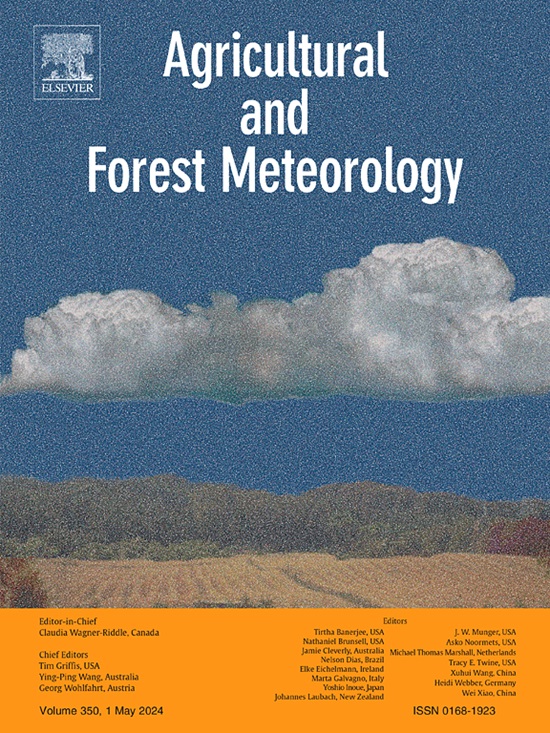干-复湿循环降低了土壤有机质分解的温度敏感性
IF 5.6
1区 农林科学
Q1 AGRONOMY
引用次数: 0
摘要
土壤有机碳分解在全球碳循环中起着至关重要的作用。其对变暖的敏感性显著影响着气候变化。然而,由于气候变化引起的水循环变化,土壤干-再湿对有机碳分解敏感性的影响仍然知之甚少。研究了干湿循环对有机碳分解温度敏感性(Q10)的影响及其潜在机制。我们收集了2个C3C4植被切换23年和33年的农田土壤,土壤在20°C或30°C下交替干燥-再湿循环(100% - 20%持水能力,WHC)或恒定水分(60% WHC)下培养180天。利用13C自然丰度,我们将CO2源从最近的SOC (C4, <;23或<;33年)和旧的SOC (C3, >;23或>;33年)中区分出来。结果表明,增温和干复湿均促进了土壤有机碳总分解。不同湿度条件下,旧有机碳Q10比新有机碳高0.25 ~ 0.40个单位。与恒定湿度相比,6个干燥-再湿循环使总有机碳、近期有机碳和旧有机碳的Q10降低了0.30 ~ 0.44个单位,这是因为在干燥-再湿过程中变暖的主导作用减弱了。这表明在恒定湿度条件下,常用的Q10可能被高估,表明在实际土壤湿度波动条件下,有机碳库对气候变暖的反馈可能比预期的要弱。本文章由计算机程序翻译,如有差异,请以英文原文为准。
Drying-rewetting cycles decrease temperature sensitivity of soil organic matter decomposition
Soil organic carbon (SOC) decomposition is crucial in the global carbon cycle. Its sensitivity to warming significantly impacts climate change. However, the effect of soil drying-rewetting, a consequence of climate change-induced water cycling shifts, on SOC decomposition sensitivity remains poorly understood. This study investigated how drying-rewetting cycles affect the temperature sensitivity (Q10) of SOC decomposition and its underlying mechanisms. We collected soils from two farmlands with 23- and 33-year C3![]() C4 vegetation switches The soils were incubated at 20 °C or 30 °C for 180 days under alternate drying-rewetting cycles (100 %−20 % water holding capacity, WHC) or constant moisture (60 % WHC). Using 13C natural abundance, we differentiated CO2 sources from recent SOC (C4, <23 or <33 years) and old SOC (C3, >23 or >33 years). Results showed that warming and drying-rewetting enhanced total SOC decomposition. Across moisture conditions, the Q10 of old SOC was 0.25−0.40 units higher than that of recent SOC. Six drying-rewetting cycles decreased the Q10 of total, recent, and old SOC by 0.30−0.44 units compared to constant moisture, as warming became less dominant during the drying-rewetting process. This indicates that the commonly used Q10 might be overestimated under constant moisture, suggesting that the feedback of SOC pools to climate warming might be weaker than previously expected under real soil moisture fluctuations.
C4 vegetation switches The soils were incubated at 20 °C or 30 °C for 180 days under alternate drying-rewetting cycles (100 %−20 % water holding capacity, WHC) or constant moisture (60 % WHC). Using 13C natural abundance, we differentiated CO2 sources from recent SOC (C4, <23 or <33 years) and old SOC (C3, >23 or >33 years). Results showed that warming and drying-rewetting enhanced total SOC decomposition. Across moisture conditions, the Q10 of old SOC was 0.25−0.40 units higher than that of recent SOC. Six drying-rewetting cycles decreased the Q10 of total, recent, and old SOC by 0.30−0.44 units compared to constant moisture, as warming became less dominant during the drying-rewetting process. This indicates that the commonly used Q10 might be overestimated under constant moisture, suggesting that the feedback of SOC pools to climate warming might be weaker than previously expected under real soil moisture fluctuations.
求助全文
通过发布文献求助,成功后即可免费获取论文全文。
去求助
来源期刊
CiteScore
10.30
自引率
9.70%
发文量
415
审稿时长
69 days
期刊介绍:
Agricultural and Forest Meteorology is an international journal for the publication of original articles and reviews on the inter-relationship between meteorology, agriculture, forestry, and natural ecosystems. Emphasis is on basic and applied scientific research relevant to practical problems in the field of plant and soil sciences, ecology and biogeochemistry as affected by weather as well as climate variability and change. Theoretical models should be tested against experimental data. Articles must appeal to an international audience. Special issues devoted to single topics are also published.
Typical topics include canopy micrometeorology (e.g. canopy radiation transfer, turbulence near the ground, evapotranspiration, energy balance, fluxes of trace gases), micrometeorological instrumentation (e.g., sensors for trace gases, flux measurement instruments, radiation measurement techniques), aerobiology (e.g. the dispersion of pollen, spores, insects and pesticides), biometeorology (e.g. the effect of weather and climate on plant distribution, crop yield, water-use efficiency, and plant phenology), forest-fire/weather interactions, and feedbacks from vegetation to weather and the climate system.

 求助内容:
求助内容: 应助结果提醒方式:
应助结果提醒方式:


